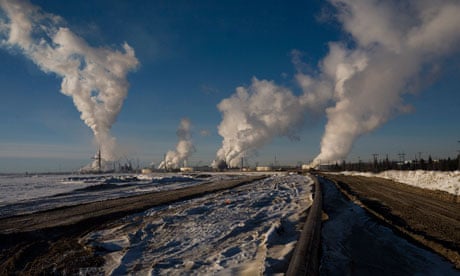Canada let loose an extraordinary rant against opponents of a controversial project to pump tar sands crude to Pacific Coast ports on Monday, accusing campaigners of colluding with foreign "radicals" and "jet-setting celebrities" to hijack the government.
The diatribe, which came as an open letter from the natural resources minister Joe Oliver, caused a furore in Canada.
It was seen as a sign of the conservative government's frustration at growing opposition to its efforts to find global markets for its vast reserves of tar sands crude, a type of petroleum deposit found in large quantities in Canada.
Opponents of the project object to over-turning a decades-old moratorium on oil tanker traffic on the British Columbia coastline, running a pipeline through British Columbia's northern wilderness, and sending jobs out of the country.
But in his open letter, Oliver accused opponents of controversial pipeline projects of destroying Canada's economy in pursuit of their "radical ideological agenda" by blocking the government's efforts to find new markets for tar sands crude.
"Their goal is to stop any major project no matter what the cost to Canadian families in lost jobs and economic growth. No forestry. No mining. No oil. No gas. No more hydro-electric dams," Oliver wrote.
Canada's efforts to find an outlet for its tar sands crude received a setback last November when the Obama Administration announced a one-year delay in the Keystone XL project, which was intended to deliver crude to refineries on the Texas Gulf coast.
With Monday's letter, the Canadian government is exhibiting concerns that a second potential outlet – to China, via the Northern Gateway pipeline – could also be in jeopardy because of public opposition.
In his public letter, Oliver writes that the pipeline opponents have dangerous allies.
"They use funding from foreign special interest groups to undermine Canada's national economic interest. They attract jet-setting celebrities with some of the largest personal carbon footprints in the world to lecture Canadians not to develop our natural resources," he said.
On Friday, the prime minister, Stephen Harper, also accused foreign environmental activists of trying to infiltrate the public comment process on the Northern Gateway pipeline.
The conservative government's hardball tactics come ahead of Tuesday's public hearings on the Northern Gateway pipeline. More than 4,300 people have signed up to comment on the project; environmental groups believe most want to block the pipeline.
The project, proposed by Enbridge Inc, would construct a 730-mile pipeline from the tar sands to a new port at Kitimat, British Columbia, where the crude would be loaded onto tankers for transport to ports on the US west coast and Asia.
It has assumed increasing importance to the Canadian government's energy strategy after the State Department delayed a final decision on the Keystone XL pipeline for a year.
The delay, ordered last November, was seen as a political ploy, giving Obama an out from making a politically sensitive decision in an election year.
Congress went on to put a 60-day deadline on a decision in an end-of-the-year spending bill, putting Obama on the spot once again. But instead of putting Keystone back on the fast-track, the ultimatum could push the administration to reject the project outright, officials warned.
That has made the Canadian government increasingly anxious about finding an exit route for its tar sands crude.
But Oliver's unusually strong language attracted widespread criticism.
Canada's Green party leader, Elizabeth May, hit back with an open letter of her own, suggesting that Oliver's letter bore the fingerprints of spin doctors from the prime minister's office.
"I respect you and like you a lot as a colleague in the House," May wrote. "Unfortunately, I think your role as Minister of Natural Resources has been hijacked by the PMO spin machine. The PMO is, in turn, hijacked by the foreign oil lobby."
May went on to set out the reasons for her own opposition to the project, the dangers of pumping crude across Frist Nations lands and wilderness areas, as well as the risks of oil spills from tankers carrying the crude across the Pacific to China.
"By characterising this issue as environmental radicals versus Canada's future prosperity you have done a grave disservice to the development of sensible public policy," she said.



